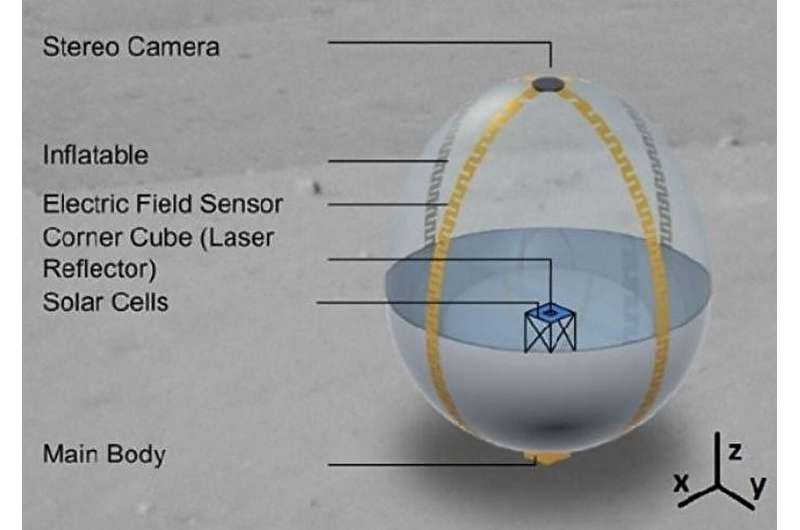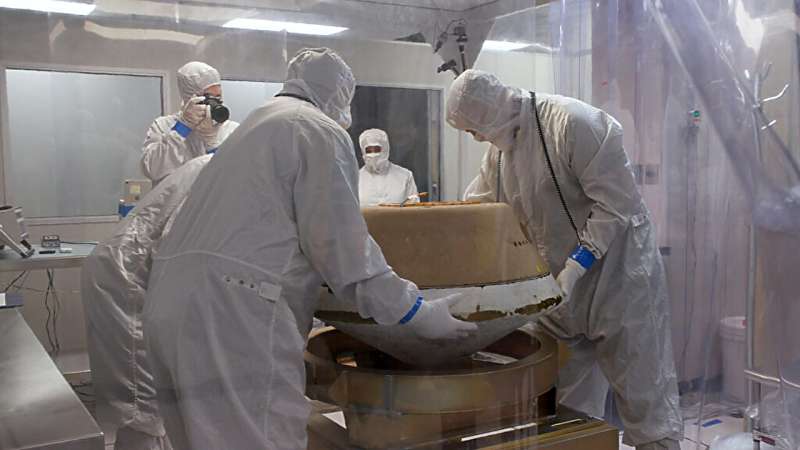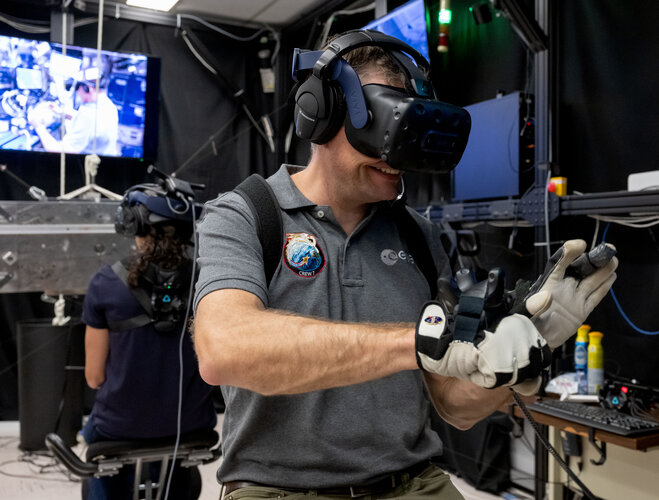
Copernical Team
SpaceX misses attempt for record-breaking 'double-launch' attempt
 SpaceX on Thursday again scrubbed the launch of its Falcon Heavy rocket and EchoStar's Jupiter 3 satellite, missing an opportunity for a record-setting "double launch."
The company was scheduled to launch the Falcon Heavy rocket within 44 minutes of launching a Falcon 9 rocket carrying Starlink satellites which, according to a report in Space Flight Now, would break a record for the sho
SpaceX on Thursday again scrubbed the launch of its Falcon Heavy rocket and EchoStar's Jupiter 3 satellite, missing an opportunity for a record-setting "double launch."
The company was scheduled to launch the Falcon Heavy rocket within 44 minutes of launching a Falcon 9 rocket carrying Starlink satellites which, according to a report in Space Flight Now, would break a record for the sho Meteor showers—it's worth looking out for 'shooting stars' all year round

If you have ever seen a shooting star on a clear night, surely someone has invited you to make a wish. Nevertheless, this is a natural phenomenon without any magical connotation—beyond its great beauty, of course.
What is a shooting star, really? Where do these glowing, moving bodies come from? How and when can we observe this astronomical phenomenon?
Meteor shower or shooting stars?
Although we popularly call them shooting stars, they are not really stars but glowing dust particles. To understand why, it is a good idea to first distinguish between a meteoroid, meteor, and meteorite.
The word "meteor" refers to the astronomical phenomenon that occurs when one or more particles of matter (meteoroids) enter the atmosphere at high speed. These meteoroids, which are usually very small (between a tenth of a millimeter and a few centimeters in size), are fragments of dust, ice, or rock that wander through space.
Need to image an asteroid close up? There's an AMIGO for that

There are so many asteroids. Just in our own backyard, we've found over 30,000 Near Earth asteroids. Exploring them using traditional methods and launching a custom-made mission, like Hayabusa or OSIRIS-REx, would almost certainly be cost-prohibitive. So how can we assess whether they would make good targets for early asteroid mining missions? Ground imaging can help, but there's nothing like being on-site on one of these asteroids to get a sense of what they are made of. Those visits would be much easier if we mass-produced the Asteroid Mobile Imager and Geologic Observer (AMIGO).
AMIGO is a concept developed at the University of Arizona. It is a standard design that fits into a 1U CubeSat package of 10 x 10 x 10 cm and carries an array of scientific equipment with it. These include a magnetometer, an electric field sensor, a microscope, a laser range finder, an inertial measurement unit (IMU), and, of course, a camera.
NASA's OSIRIS-REx spacecraft adjusts course to get closer to Earth

On July 26, NASA's OSIRIS-REx spacecraft fired its engines for about 63 seconds to slightly thrust itself onto a course closer to Earth.
Preliminary tracking data indicates OSIRIS-REx changed its velocity, which includes speed and direction, by 1.3 miles, or 2 kilometers, per hour.
Keeping your underwear clean on the Moon

When astronauts return to the Moon they will be bringing along a new generation of spacesuits, designed to withstand the harsh conditions of the lunar surface. But in keeping their human occupants safe and comfortable, these suits might also become a fertile environment for harmful microbial life – especially as astronauts will potentially be sharing suits with one another.
Better SAFER than sorry
 Image:
Astronaut Andreas Mogensen undergoing VR training for EVA emergencies
Image:
Astronaut Andreas Mogensen undergoing VR training for EVA emergencies Mawrth Vallis region - the deepest clay deposits on Mars
 New images, created using data acquired by the German Aerospace Center (Deutsches Zentrum fur Luft- und Raumfahrt; DLR) High Resolution Stereo Camera (HRSC) on board ESA's Mars Express spacecraft, show part of the dried-up Mawrth Vallis river valley. This is one of the largest and oldest valleys on Mars, where light-coloured clay deposits up to 200 metres deep can be found in numerous places. Cl
New images, created using data acquired by the German Aerospace Center (Deutsches Zentrum fur Luft- und Raumfahrt; DLR) High Resolution Stereo Camera (HRSC) on board ESA's Mars Express spacecraft, show part of the dried-up Mawrth Vallis river valley. This is one of the largest and oldest valleys on Mars, where light-coloured clay deposits up to 200 metres deep can be found in numerous places. Cl Astronomers reveal new features of galactic black holes
 Black holes are the most mysterious objects in the universe, with features that sound like they come straight from a sci-fi movie. Stellar-mass black holes with masses of roughly 10 suns, for example, reveal their existence by eating materials from their companion stars. And in some instances, supermassive black holes accumulate at the center of some galaxies to form bright compact regions known
Black holes are the most mysterious objects in the universe, with features that sound like they come straight from a sci-fi movie. Stellar-mass black holes with masses of roughly 10 suns, for example, reveal their existence by eating materials from their companion stars. And in some instances, supermassive black holes accumulate at the center of some galaxies to form bright compact regions known Cambodia nears completion of controversial Naval Base, amid US concerns
 Work on the controversial naval base in Cambodia, suspected by the United States of being earmarked for Chinese military use, is reportedly nearing completion. The Cambodian government confirmed on Tuesday that the base is on the brink of being operational, despite persistent international concerns.
This report is according to Chhum Socheat, a Cambodian defense ministry spokesman, who spok
Work on the controversial naval base in Cambodia, suspected by the United States of being earmarked for Chinese military use, is reportedly nearing completion. The Cambodian government confirmed on Tuesday that the base is on the brink of being operational, despite persistent international concerns.
This report is according to Chhum Socheat, a Cambodian defense ministry spokesman, who spok Multi-levitation bioprinting of heart models for space exploration and medicine
 As a bold venture at the forefront of biomedical research, the PULSE project is poised to develop paradigm-changing bioprinting technology for applications in space and on Earth. Awarded nearly 4 million euros by the European Innovation Council's Pathfinder Open, PULSE emerges from interdisciplinary scientific collaborations and, over five years, will foster technological innovations to improve
As a bold venture at the forefront of biomedical research, the PULSE project is poised to develop paradigm-changing bioprinting technology for applications in space and on Earth. Awarded nearly 4 million euros by the European Innovation Council's Pathfinder Open, PULSE emerges from interdisciplinary scientific collaborations and, over five years, will foster technological innovations to improve 
